Food Labelling Regulations Training Course
Quantity: 1

Duration 2-3 hours
Last audited 9th October 2024
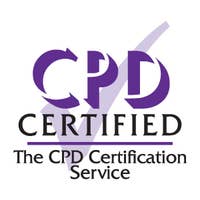
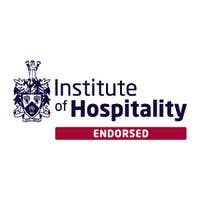

100% online training
Start when you like
Learn on any device (desktop, mobile or tablet)
Instant assessment and result
1 learner per course
Train teams of all sizes
Bulk discounts starting at 10% off 10 courses
Pay by invoice with 30 day payment terms available (5+ courses)
Includes a 10% discount for 10+ courses
This Food Labelling training course has been designed by food industry experts to help food businesses understand how to label their food products legally and correctly.
The overall aim of the Food Labelling Regulations is to ensure that customers can make informed choices in relation to the food they consume, as well as to prevent any practices that may mislead the consumer. This course explains each of the food labelling requirements under the Food Information Regulations 2014 and FIC Regulations. This course also provides information on what can and cannot be said in relation to nutritional claims and health claims, explains the importance of allergen labelling and outlines the reserved descriptions and composition standards for specific food products.
100% online training
Access anywhere
Same day digital certificate
Printed certificate posted next working day
Full audio voiceover
Assessment retakes at no extra cost
Learn at your own pace with no completion deadlines
Developed by food industry experts
Up to date with the EU Food Information for Consumers (FIC) Regulation and current allergen legislation in the UK, Natasha's Law and PPDS labelling requirements
Accredited by CPD and endorsed by the Institute of Hospitality
Bulk discount for orders of 10+ courses

Save on our courses when you buy more training upfront. Lock in a better price now and access the training whenever you need to. You can mix and match any of our courses too and get the discount off your whole order.
10+ courses = 10% off
50+ courses = 20% off
100+ courses = 30% off
500+ courses = 40% off
By the end of this course, learners will:
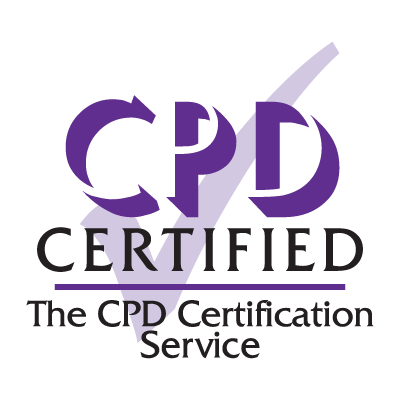
Accredited by CPD
All of our courses are accredited by the CPD Certification Service as conforming to universally accepted Continuing Professional Development (CPD) guidelines.

Endorsed by the Institute of Hospitality
Additionally, this course is endorsed by the Institute of Hospitality as providing independently-evaluated, quality content that teaches good practice standards.
Recommended renewal:
3 years
What does this mean? This certificate does not have an expiry date, however, based on industry best practice guidelines there is a recommended renewal period.
Our in-house Learning Designers develop all of our courses to give you and your learners the most engaging training possible.
.jpg?cb=134166638690470683)
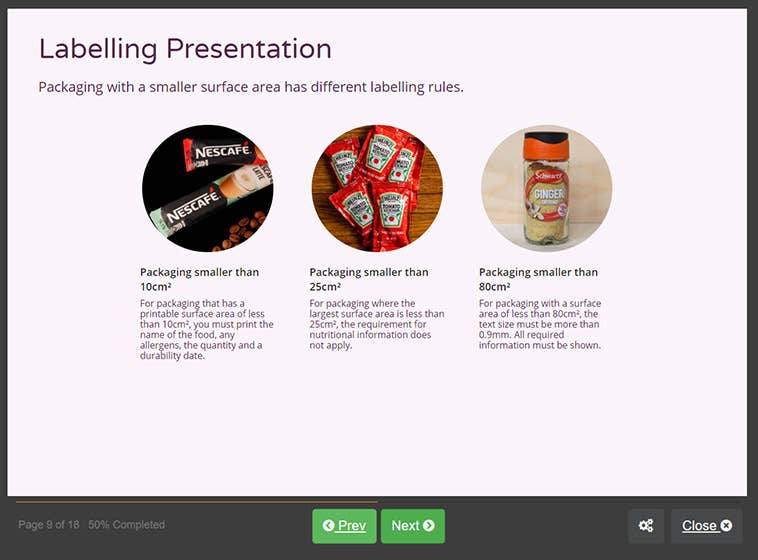
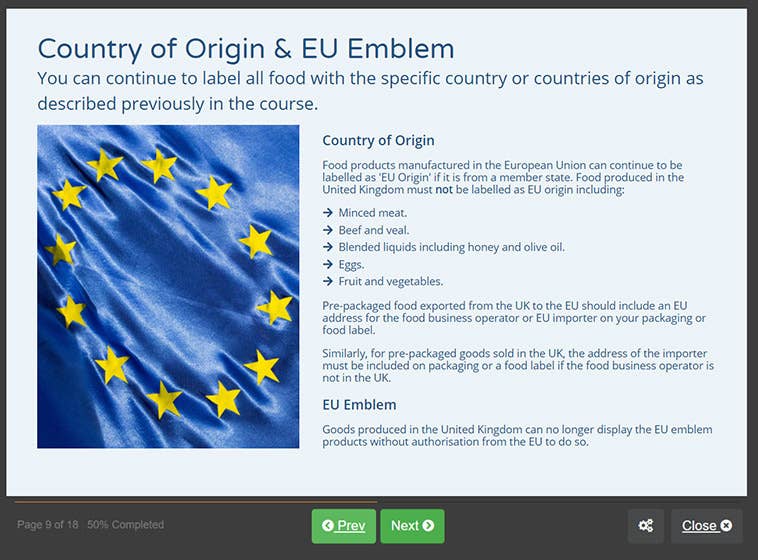
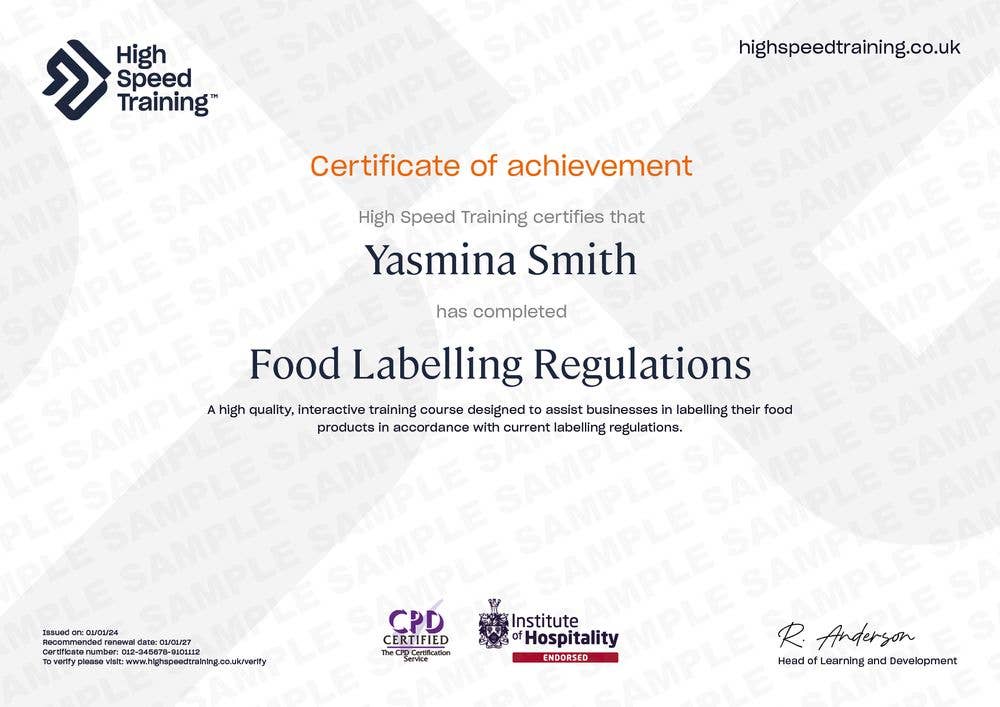
.jpg?cb=134166638690470683)



Informed choices, labelling requirements for packaged foods, labelling requirements for loose products, vertical regulations, UK food labelling regulations, and labelling presentation.
Name of the food, allergens, durability date, lot code marking, list of ingredients, QUID, rework, net quantity, 3 Packers' Rules, special storage conditions, name and address of the food business operator, country of origin, instructions for use, and wine labelling.
Nutritional information, traffic light nutritional labelling, nutritional tolerances, claims, alcoholic strength, traceability, product recalls, and distance selling regulations.
Basmati rice, cocoa and chocolate, milk, condensed, dried and instant formula, fat spreads, sugar and sweeteners, honey, olive oil, jam, meat products, fish & molluscs, fruit juice, bottled water, soluble coffee, bread and flour, and food additives and colours.
Barcodes, marketing terms, voluntary declarations, symbols, organic, vegan symbols, kosher & Halal, and clean labelling.
UK protected geographical food names scheme, country of origin & EU emblem, minced meat, beef and veal, blended liquids, eggs, fruits and vegetables, health and identification mark and The Windsor Framework.
The online assessment is taken on completion of the training material. You will be asked 10 multiple choice questions with a pass mark of 80%. The answers are marked automatically so you will instantly know whether you have passed. If you don't pass don't worry! You can take the test as many times as you need with no extra charge.
This Food Labelling Regulations course is suitable for all food businesses who package food for sale directly to the consumer. This includes large manufacturers, such as those who operate from factories, as well as smaller businesses, such as bakeries, that pre-package their own food to sell.
All of our training is done within your web browser - there are no apps to download or software to install.
After picking the courses you need and completing your purchase, you will receive a confirmation email. To access our courses yourself or to distribute them to others you just need to click the ‘Get Started’ button within the email and select which option you want. You will then be able to add the course(s) into an existing account, or create a new account.
Of course just add the amount of courses you need and follow the purchase process. Please do be aware that it is one course per learner so they will all need their own course.
When buying courses for a team you'll also get access to our Management Suite free of charge. This is a tool that will allow you to allocate, track and review the training of your team.
Did you know? - We offer free training sessions on how to get the most from your Management Suite. To benefit from this, please contact: managersupport@highspeedtraining.co.uk to get your session booked in.
Yes, our bulk discounts are automatically applied to orders containing any combination of courses. We offer the following discounts on bulk purchases:
If you purchase 10+ courses you receive a 10% discount
If you purchase 50+ courses you receive a 20% discount
If you purchase 100+ courses you receive a 30% discount
If you purchase 500+ courses you receive a 40% discount
You can pay for our training using either a Debit or Credit card.
For companies ordering 5 or more courses, you’ll also be given the option to pay by invoice. If you would like to pay by invoice for fewer than 5 courses then please contact our Sales Team by calling 0333 006 7000 or emailing us at sales@highspeedtraining.co.uk.
Yes. You can use your username and password to log in and revisit the training material as many times as you like, even after completing the course.
No, we want our courses to work around you so there’s no time limit in which you must complete the training after making a purchase. You can also split your training over as many different sessions as you wish, as course progress is saved as you make your way through the training. You’re free to learn entirely at your own pace.